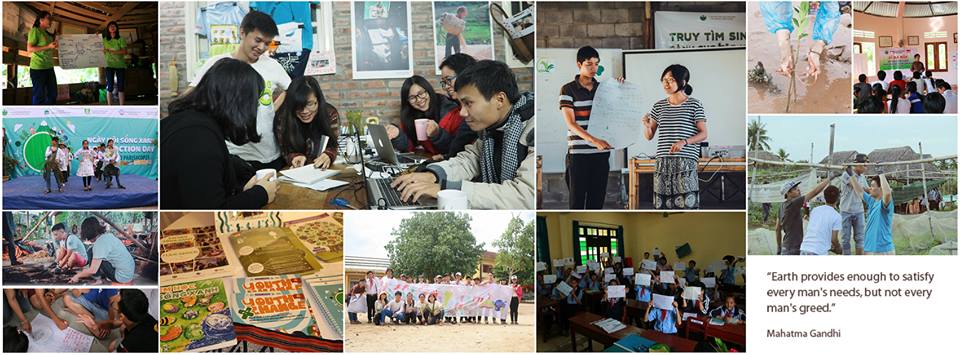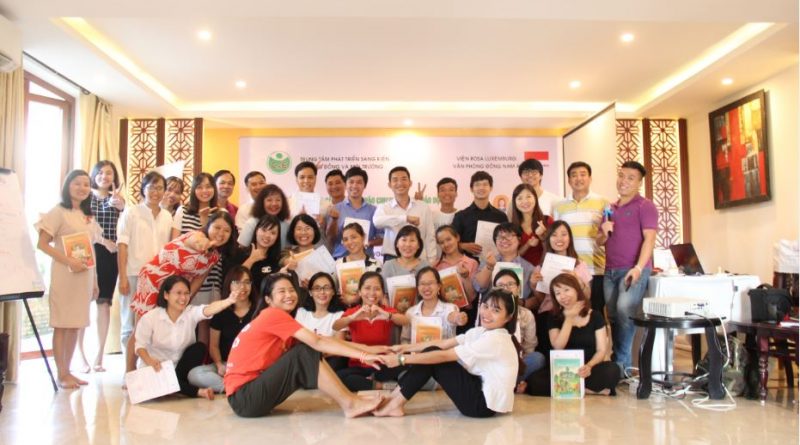INTERGRATING INNOVATIVE APPROACHES INTO EDUCATION PROGRAM ON ECOLOGICAL LIFESTYLE FOR STUDENTS
Trainning “Intergrating innovative approaches into education program on ecological lifestyle for students“ which is for young lecturers who are interested in and want to be involved in teaching and working in universities
Ecological lifestyle is one of the goals we aim for. Perhaps, it is time for us to work together, to build an ecological lifestyle that represents the responsibility of every individual in life. Especially students of universities because they are citizens, producers, decision makers in the future.Their lifestyle will determine future patterns of production and consumption, as well as determine the transition to a sustainable ecological society.
On 18/9/2018, the training course “Intergrating innovative approaches into education program on ecological lifestyle for students“ was officially opened. It is an activity in the “Scaling up and mainstreaming innovative approaches on ecological movement into activities of universities” which is organized by Center for Development of Community Initiative and Environment (C&E Center) with the support from Rosa Luxemburg Stiftung – Southeast Asia.

The training was conducted in 4 days from 18-21 September, 2018 by Mrs. Bui Thi Thanh Thuy _ Deputy Director of C & E Center, who is coordinator, with the participation of experts in environment and education such as Mr.Tran Duc Tuan (Director of IRESD Institute for Sustainable Development Studies), Mr. Pham Quoc Loc (Cetac Academic Educator), Mr. Nguyen Duc Tung (Deputy Director of Institute for Environment and Development Sustainable, Ms. Nguyen Thuy Linh (Director of CECEM Community Empowerment Center). This is the second time it has been held, following the success of the Ecological lifestyle training program 2017, which was first organized by the Center for Community and Environmental Initiatives (C & E).

During 4 days of training with the participation of 34 lecturers from more than 25 universities in provinces, cities such as Hanoi, Thai Nguyen, Vinh, Hue, Da Nang, Da Lat, Quang Nam, Quy Nhon, Ho Chi Minh, Kien Giang. Groups of teachers, trainers and educators from different universities and organizations in provinces and cities across the country have worked together, exchanged and developed the approaches effectively as well as planned to integrate ecological lifestyle into educational program. After that, they were encouraged not only to perform integration activities individually but also to work together in implementing ecological lifestyle education by using the toolkit with topics such as: “Living without garbage”, “Gardening difficult or easy”, “Responsible tourism”, “Reasonable Water Consumption”, “Shopping – Enough or not enough, Not enough or enough”, “Sustainable food consumption”.

In addition to the lecture on “Liberal Education” by Mr.Pham Quoc Loc and Mr.Tran Duc Tuan’s “Pedagogical skills”, with the aim of strengthening the theoretical students with practice, during the training course, participants had access to the “Learning by experience” methods taught by Ms. Nguyen Thuy Linh, participants were involved in fieldwork at An Nhien Farm and Tan Bamboo. Practitioners are aware of and observe the realities of sustainable ecosystems, learn about organic composting, how to recycle soap, make bamboo products so that students have access to a no-waste lifestyle, “Gardening is easy or difficult!” and “Shopping – enough or not enough, not enough or enough”.
The last day of the trainees’ training course was a way to integrate the ecological lifestyle into the teaching of the students. Teams in the areas have developed their own ecotourism action plan. The training provided the trainers with additional ways to integrate creativity into the education of students.

At the end of the training session, Mr. Tran Duc Tuan, Director of IRESD Institute for Sustainable Development Studies and Education, has declared the establishment an Action Network for Sustainable Development of Ecology and Society in order to strengthen the interconnection and develop the cooperative relationship for the sake of sustainable transformation of education institutions (universities, high schools, community education) in Vietnam

